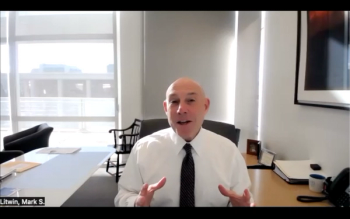
- Vol 48 No 1
- Volume 48
- Issue 1
The physician executive: How one urologist balances MD, CEO roles
In this interview, physician executive J. Christian Winters, MD, outlines his multiple professional roles, explains how he divides his time between clinical and administrative responsibilities, and offers advice to young urologists seeking a career in leadership.
Urology is cited as an attractive specialty due to its mix of office-based and surgical treatments, but beyond this clinical mix lies another opportunity for urologists: the role of physician executive. In this interview, J. Christian Winters, MD, outlines his multiple professional roles, explains how he divides his time between clinical and administrative responsibilities, and offers advice to young urologists seeking a career in leadership. Dr. Winters is vice chancellor for clinical affairs, CEO, and professor and chair of urology at Louisiana State University HealthCare Network, New Orleans.
Dr. Winters was interviewed by Urology Times Editorial Consultant Stephen Y. Nakada, MD, the Uehling Professor and founding chairman of urology at the University of Wisconsin, Madison.
Please discuss your current roles at Louisiana State.
I was appointed to the position of vice chancellor about 3 years ago. I am responsible for coordinating the clinical activities of all the schools and the Health Sciences Center, so I work with the schools of Allied Health Professions, Dentistry, Graduate Studies, Medicine, Nursing, and Public Health. The School of Medicine is about 80% of my focus, but I facilitate the clinical care activities of all those schools.
During that time, the CEO of the LSU HealthCare Network retired and I became the interim CEO. Eventually, I merged the vice chancellor and CEO positions because of their synergy. So I'm now the CEO of the network, in addition to vice chancellor of clinical affairs. This allows me to not only manage the physician line, but also the operational line as well. I've been in this dual role now for about 2-1/2 years.
Please discuss what you do during an average week.
I'm still practicing urology about 40% of the time. I have a clinic day and an OR day, and the rest of the week is balanced with administrative duties. I don't really have dedicated chair time; I incorporate that in my administrative time, like probably all of us do. I meet with the executive team, and then I have a meeting with the leadership team of the system. Following that, my time is based on the strategies of the system and various clinical needs. I spend most of my time with the operative managers of each clinical site and the senior vice presidents of the system. I also spend time with chairs and section heads of the clinical departments, trying to optimize clinical functions.
What are the key skills or attributes that have made you suitable for this position?
Listening and remembering are the two biggest things. I find that the only way to be able to communicate in the most meaningful way is to communicate with all stakeholders by listening to them with the goal of learning something new. That way, you develop an understanding of their needs and requests. From there, it becomes a lot easier to communicate (even negatively), as you can express things in a way that’s most relevant to them. Also, I find that people become more engaged and collaborative with you when you remember and follow up. Either you can facilitate their requests or provide an alternative that works which achieves their goals.
Next:
I find it to be a matter of both. I think most communication skills are innate in all of us in one way or the other. However, through either being a clinician or a chairman, we refine those skills. As urologists, we have very sensitive conversations with our patients on a daily basis, and that does help you prepare for many of the interactions encountered in leadership roles. I will say, though, that the administrative tasks of chairing the department helped me stay organized as my role expanded.
How have you changed as a department chair since you've been in this role?
I like to think I’m a better department chair, but I guess you’ll need to ask my faculty! First, I spend more time overseeing the department, because I have more dedicated time which I never really had before. More importantly, my executive roles have allowed me to view all of our departmental activities in a much more integral way with the rest of the Health Sciences community, in my case, not just within the School of Medicine, but in all aspects of the Health Sciences Center community. I've been able to integrate my department into multiple disciplines within oncology, where we're probably one of the more integrated units in the entire system. Being exposed to other components of the Health Sciences Center benefits my department, because I have more familiarity with processes that may have been more foreign to me just as a department head.
A number of urologists hold a role similar to yours. Do you think there is a reason for this?
Urologists are very personable people. People remember most how they're treated, and I think urologists tend to be easy to get along with. Also, urology is an interesting profession because we have a high-volume patient turnover in both the office and outpatient setting, so we are exposed to a diverse spectrum of health care. This makes urologists pretty well versed to do to assume leadership roles across health systems.
Do you feel that remaining in clinical practice is critical to success in your administrative role, or is that something that's just worked out?
Unequivocally, no question it is. It makes me a better leader. All physicians deal with the frustrations of the EMR, phone systems, and things like that. Because I'm still in practice, I understand (and experience) these frustrations as viscerally as they do, which is helpful in trying to fix these problems. It also helps me relate to the physicians on a different level. When they open up the schedule, they see me on there, seeing patients as well. I’m convinced it does help.
Next:
How would you compare how an academic institution has to perform compared to a private group practice?
That's an interesting question. Academic institutions are largely becoming like private institutions; many of them have basically separated out some of their clinical components to an entity that functions more like a private practice. I think we are under similar private practice-type pressures to a significant degree in academic medicine.
But academic medicine has its own challenges. How can we get protected time to do research? How can we get the resources to teach our students and train our residents? How can we expand simulation efforts? I find the biggest challenge in academic centers is that the clinical resources that we're getting are being increasingly used to subsidize the academic mission of our institution. That makes productivity-based incentives harder sometimes as there may be less expendable resources.
On the other hand, private group practices also have pressures of their own: How can they expand, provide the same level of service consistently, and stay competitive in this era of acquisition and consolidation? I see all practice models as having many challenges that will likely change as our marketplaces continue to evolve. Every type of practice needs to remain engaged so they can prospectively meet these demands.
Do you think you need to be a department chair before you take on a leadership role in a health care system?
I don't think so. Although being a department chair facilitates development of the innate qualities that you need to lead, it also encompasses a lot of tasks you have to perform to manage that unit. At the executive level, it's more about setting goals; it's about setting a vision, and empowering others to achieve. What is needed is to have experience with managing people at a pretty substantive level, whether it's a section head, center head, committee, board chair, or other administrative pursuits that allow you to develop organizational and leadership skills.
You've been extremely successful in both roles. How would you counsel a young person starting in practice on how best to prepare themselves to be a department chair or potentially a leader in health care administration?
First, get a good mentor, somebody who can answer your questions and who will allow you to learn by doing. Second, seize the opportunities available to you where you are. There are a lot of opportunities in every organization to get involved in the administrative architecture and "rise up," which is what happened to me.
I'm not going to comment specifically on formal training; do you need to get an MBA or an MPH? That's a topic of debate in our area. I don't have either. Certainly, whatever you can do to educate yourself, whether it's a professional development course or another method, is very helpful, because there are some aspects of reporting and data that we see on the leadership level that you don't learn in medical school or residency. I do not think it’s a necessity for all, but advanced training is clearly valuable and will also open more windows of opportunity.
Articles in this issue
about 6 years ago
New agents may offer hope for two forms of hyperoxaluriaabout 6 years ago
Protocol cuts narcotic use in IPP patientsabout 6 years ago
Pembrolizumab granted new bladder Ca indicationabout 6 years ago
Could mpMRI replace prostate Bx for surveillance protocols?about 6 years ago
OnabotA use on the rise for neurogenic bladderabout 6 years ago
Study of stone pain stresses personalized treatmentabout 6 years ago
Pain-focused stone patients less likely to reach treatment goalsabout 6 years ago
Biofeedback training code deleted, replaced with time-based codesNewsletter
Stay current with the latest urology news and practice-changing insights — sign up now for the essential updates every urologist needs.






